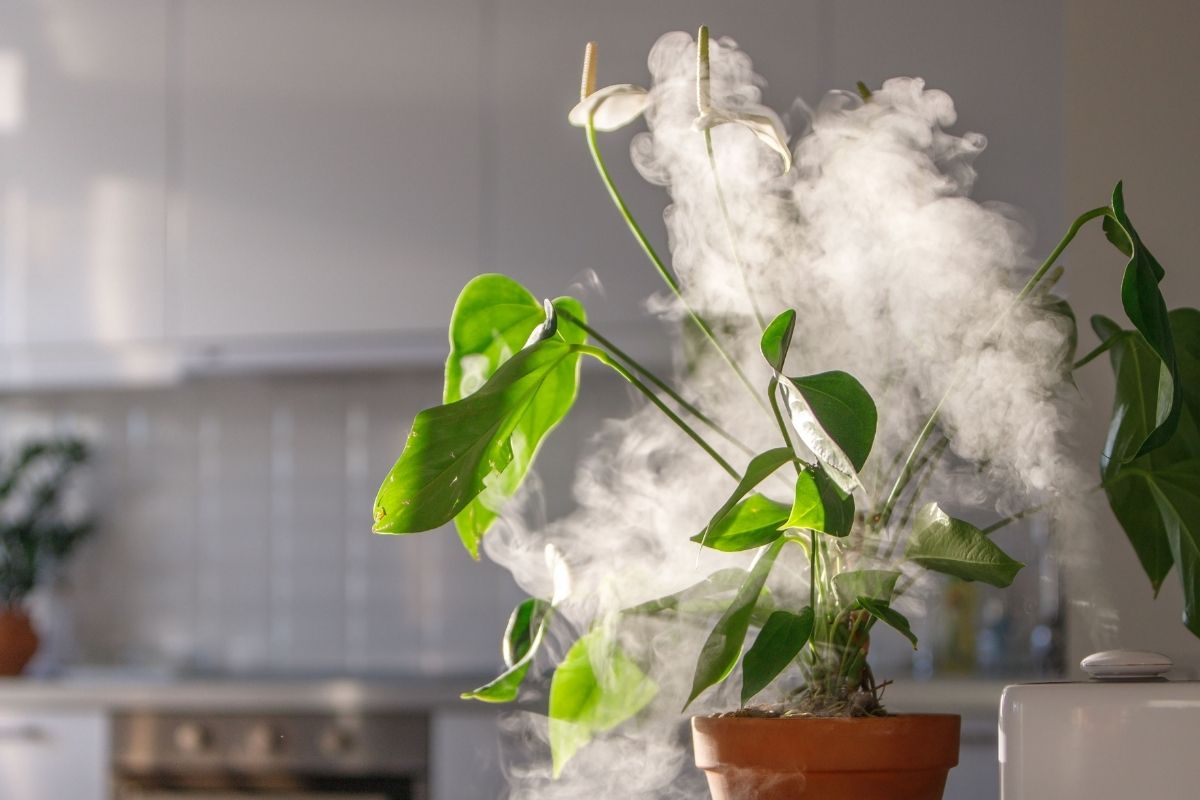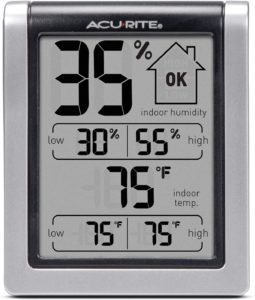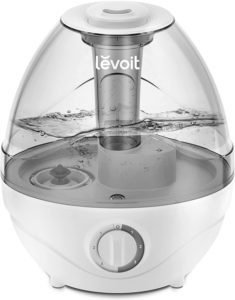Many of us don’t think twice about our home’s humidity levels, but after reading some plant care articles, you may wonder if having a humidifier will help you take better care of your houseplants. Us too.
The truth is, some plants don’t like humidity, and others can take it or leave it. Kinda like me.
However, most houseplants are tropical, and while they can do fine with middle levels of humidity, they will gladly enjoy a higher moisture level than your home’s norm.
And if you have any humidity-loving plants, then plant humidifiers can be run every day or two to increase the moisture in the room. Many tropical plants get a fair amount of their water from the air, and those will do best when regularly provided with a little extra vapor. (um, hello aerial roots)
Since this isn’t a one-size-fits-all situation, it’s helpful to understand what your plant’s needs are before setting your humidifier schedule.
So that’s what we’ll help you do in this post.
why humidifiers are good for some plants
The humidity level is the amount of water vapor in the air at any moment. The more moisture in the air, the more humid it is; the less, the drier. Temperature also affects how much water is in the air: high temperatures evaporate water, and hold more of it in the air. Cool temperatures don’t hold much water, and low enough temperatures will lead to condensation, or freezing, with little to no air evaporating.
Tropical plants are used to environments with lots of moisture regularly falling, evaporating, and transpiring from all the local vegetation. Many houseplants that originate from these areas have shallow roots from living in regularly moist soils, and others have aerial roots that they use to get moisture from the air or the bark and moss on trees they cling to. This is in contrast to desert plants, like succulents, whose thick leaves tend to store as much water as possible to go through periods of time without moisture from the environment.
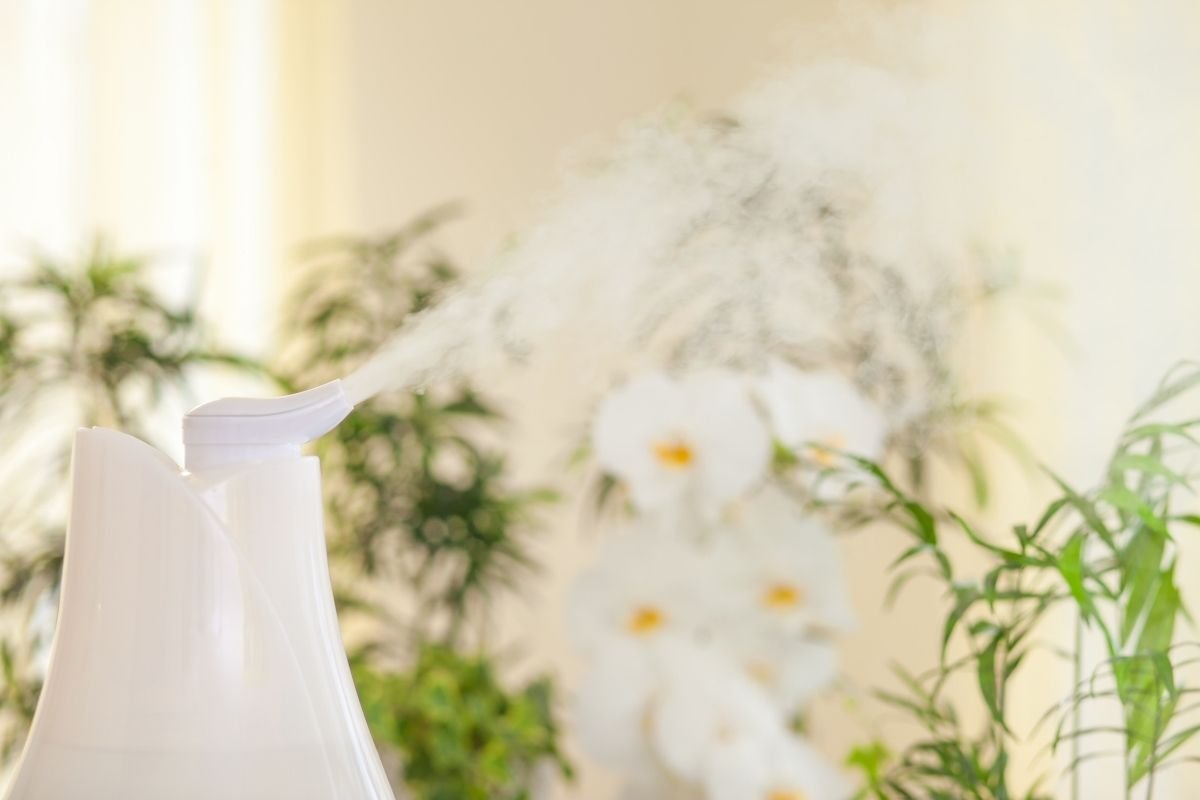
how to know if your plant needs higher humidity
The humidity level of the average home’s indoor air is about 40-50%, which is fine for most plants. However, many tropical plants like humidity in the 50-75% range, so a humidifier can help bring that number to a level that the plant will thrive in. Even homes in high-humidity locations may benefit from higher indoor humidity levels, since air conditioners and fans can lower the amount of moisture in the air.
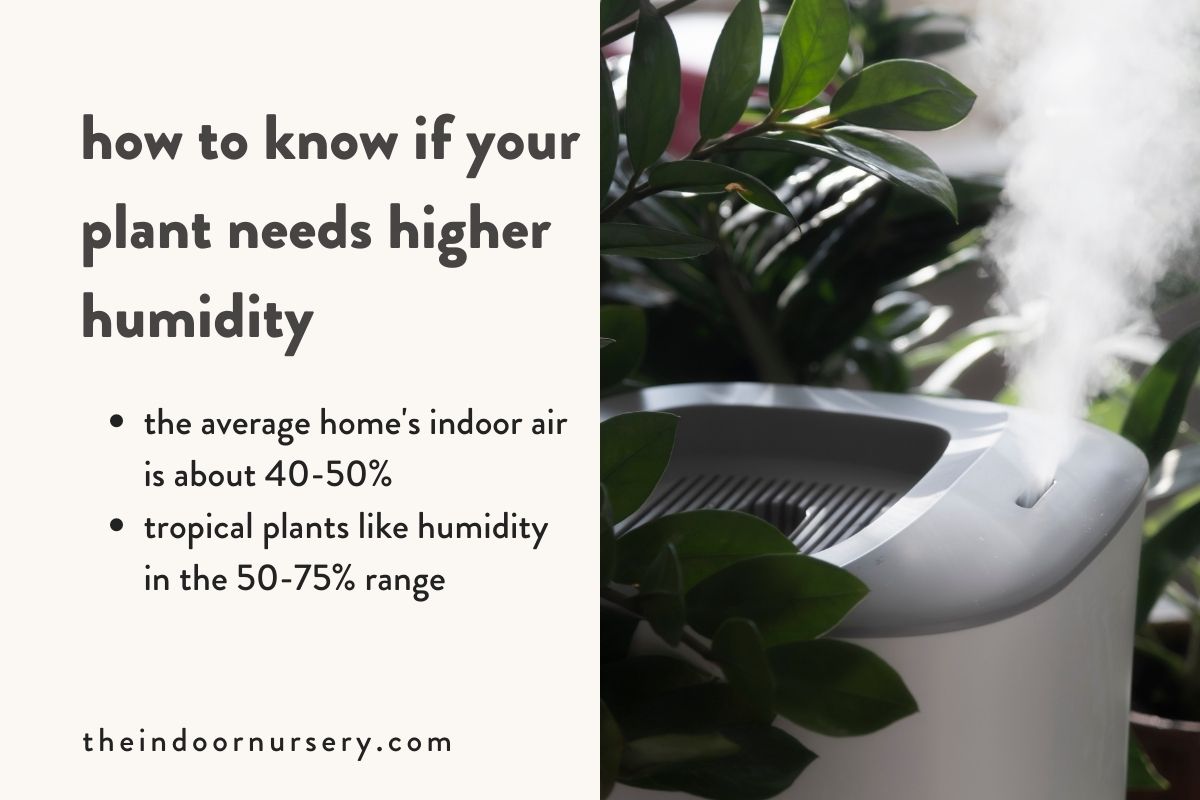
Many air conditioner systems’ display panels show the humidity level in your home, and digital thermometers usually also have a moisture reader built in. Your plants themselves may show some signs that the air is too dry. If you’ve been regularly watering and fertilizing, and the plant is getting the right amount of light, but it’s still looking stressed, then it might be a question of the humidity.
Some signs of stress from low humidity include:
- Dropping and wilting leaves
- Dry, dehydrated leaves
- Brown edges
- Brown spots
Some plants don’t like humidity at all, like cacti and succulents, and those plants with thick, sturdy leaves are especially at risk for mildew or mold growth if there’s too much moisture in the air. Some of these include snake plants, jades, peperomias, pothos, and palms.
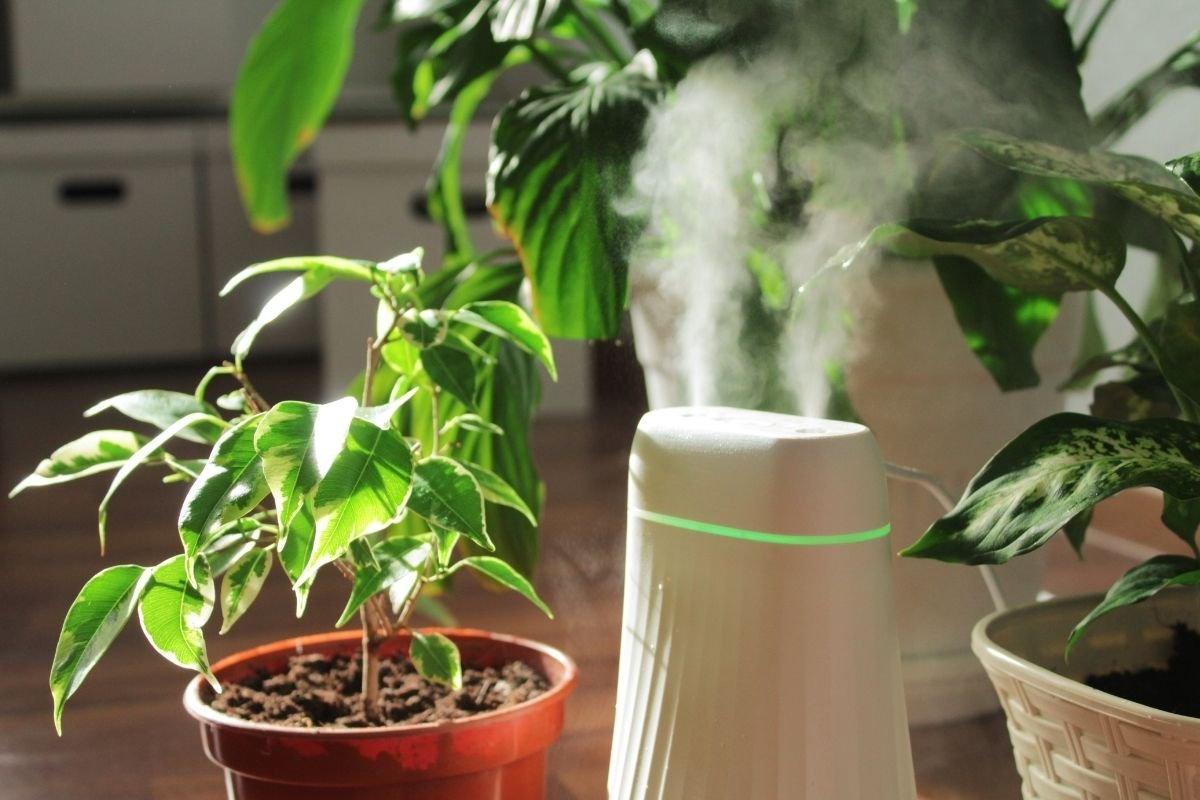
plants that love humidity
Your indoor plants from the tropics will love some extra humidity any day. Some of these plants include:
- Air plants
- Anthurium
- Calathea plants in general, like Calathea Lancifolia, Calathea Orbifolia, or Calathea ornata
- Dracaena
- Ferns
- Ficus or fig plants
- Hoya or wax plants
- Monstera
- Orchids
- Spider plants
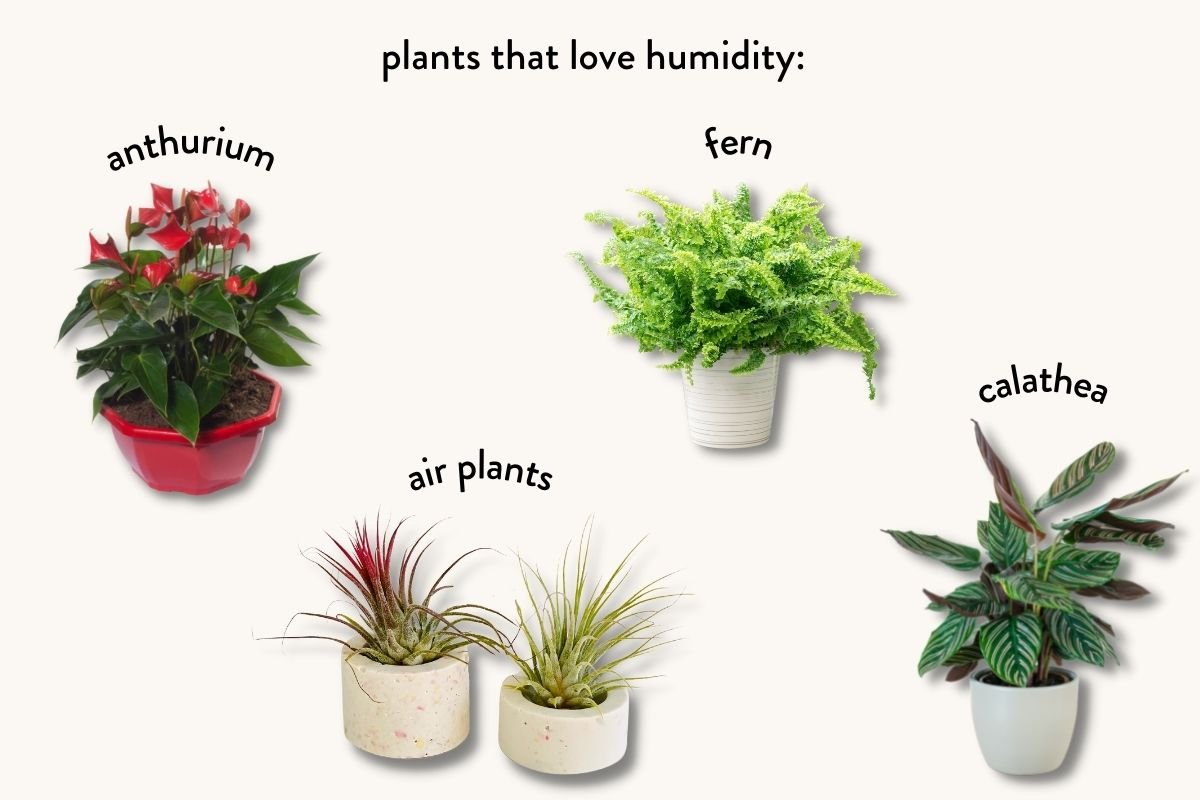
the different types of humidifiers
When you’re looking at humidifiers for your plant, you can use almost any model out there. There are two general types of humidifiers: warm mist humidifiers, and ones that use cool water.
evaporative humidifiers
This kind of humidifier heats up water to release it as a steam into the air. The water gets purified as it heats up and evaporates, although a warm mist humidifier uses more energy than cool-water options.
ultrasonic humidifiers
Cool mist humidifiers use a high-speed vibration mechanism that releases cool water as a vapor without heating it up. The vibration doesn’t make a sound we can hear, though, which is why it’s called ultrasonic. You should use purified water with a cool mist humidifier to prevent mineral buildup, but the lower energy use makes it a more environmentally friendly option, and one that can be used for longer periods of time at once.

using your humidifier
Simple humidifiers turn on with a simple switch, but many humidifiers these days come with digital panels that display the humidity level and can run automatically with a timer or a minimum-level activation, much like an air conditioner or heater.
Humidifiers shouldn’t be positioned to release their vapor directly onto the plants because too much moisture can build up on the leaves or on the soil, encouraging mildew or fungus. The humidifier also shouldn’t be kept too close to wood or walls since saturation or condensation can encourage mold growth and its associated damage. Some humidifiers have adjustable spouts, and even when pointed away from the plants themselves, the unit will raise the room’s humidity enough to keep your plants happy.
When using a humidifier, make sure there is air circulation in the room to avoid moisture buildup, condensation, or mold growth. Sunlight is also important when raising the humidity in an indoor space to help excess moisture evaporate. Mold and mildew love cool, dark, damp spaces, so be sure to balance other environmental factors in your space when increasing the humidity levels.
more about humidity
- The 6 Best Dehumidifiers For Grow Tents
- 7 Best Hygrometers For Indoor Plants
- 9 Best Plant Humidifiers For Indoor Jungle Vibes
- The best grow tent humidifier for indoor gardening
- How to increase humidity in a room with indoor plants
- How to fix low humidity leaf curl for humid-loving plants
- Where to place humidifier for plants (farther than you think)

